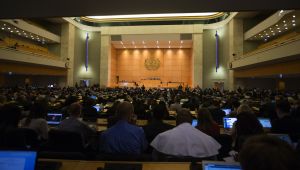Cambridge, Mass. – As Henry Kissinger has noted, a cardinal challenge for statesmen is to recognize "a change in the international environment so likely to undermine national security that it must be resisted no matter what form the threat takes or how ostensibly legitimate it appears." North Korea's acquisition of nuclear weapons constitutes just such a change. American, Chinese, and other international leaders clearly failed to prevent this transformation. As a result, we now live in a much more dangerous world.
First, Kim Jong-Il's nuclear test flagrantly defied President Bush and the international community's strongest warnings. The United Nations Security Council unanimously demanded that North Korea not proceed with its threatened test, asserting that this would "jeopardize peace, stability, and security in the region and beyond." Reiterating President Bush's earlier red line that declared North Korean nuclear weapons "intolerable," the U.S. chief negotiator at the stalled six-party talks said: "We are not going to accept it."
Kim Jong-Il's provocation asks, in effect, so what? What will the U.S., the UN, and others do? Condemn North Korea. Pass Security Council resolutions calling for "strong sanctions." He is betting that, barking aside, this coalition's bite will be tolerable, as it has been when he stepped across earlier red lines. He believes that China and South Korea fear North Korea's collapse more than they do North Korea's having nuclear weapons. Unfortunately, he is likely to be right.
What he and others, including Iran, are learning from this pattern of successive, successful defiance of the "international community" fuels further challenges.
SECOND, AS the UN High Level Panel of 2004 warned, North Korea's nuclear test is likely to trigger a "cascade of proliferation." In the weeks immediately ahead, the U.S. government will launch an initiative to reassure Japan and South Korea about the reliability of the American nuclear umbrella. To escape blame for the failure of their own policies, the governments of South Korea and Japan will speak confidently about America's nuclear deterrent. Not to worry about Kim Jong-Il's threat to attack them with nuclear weapons, they will assure fellow citizens, since the U.S. would retaliate against such an attack massively.
Quietly, however, each will be examining its "Plan B" for acquiring its own independent nuclear deterrent. If despite the most unambiguous warning from this American president that North Korea would not be allowed to acquire nuclear weapons, the U.S. and the world now find some way to acquiesce, doubts will grow about the credibility of American words to deter Kim Jong-Il's use of nuclear bombs.
Japan's decision to acquire nuclear weapons would have profound consequences in its domestic politics. Choices will be affected by many factors, including the world's response to Kim's provocation. Nonetheless, my best bet is that over the decade ahead, both Japan and South Korea will become nuclear-armed States -- undermining the security and stability that has been the foundation of East Asia's extraordinary economic growth.
THIRD, AND most important, North Korea's nuclear test increases the risk that terrorists will explode a nuclear weapon in an American city. About al-Qaida's motivation to launch a nuclear 9/11 there is no doubt. So far it has been unable to acquire the means to realize its deadliest ambitions. North Korea is the only state whose leader could plausibly conclude that selling a nuclear weapon to Osama bin Laden would advance his interests.
Kim Jong-Il's overriding objective is survival. President Bush's announced objective for this member of the "axis of evil" is regime change. North Korea is a proven blackmarketeer. As Bush's statement last week emphasized, North Korea "remains one of the world's leading proliferator of missile technology, including transfers to Iran and Syria." Despite the U.S.-led Proliferation Security Initiative that seeks to prevent North Korean exports, it reportedly delivered 18 missiles last year to Iran. If "Missles-R-Us," why not "Nukes-R-Us"?
At this point the United States and the international community have no good options. What is required now is unblinking recognition that the policies pursued by the parties to the six-party talks and the United Nations have failed. The starting point for a major strategic reassessment is to acknowledge the transformed strategic challenge we now face.
A former assistant secretary of defense, Graham Allison directs Harvard's Belfer Center for Science and International Affairs and is the author of "Nuclear Terrorism: The Ultimate Preventable Catastrophe."
Allison, Graham. “Cardinal Challenge: The World Must Take Seriously North Korea's Nuclear Provocation.” Richmond Times-Dispatch, October 26, 2006




